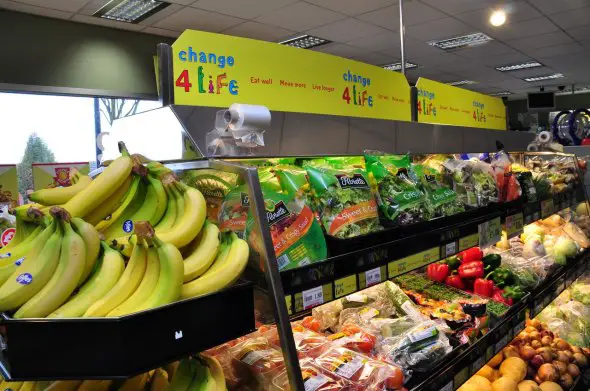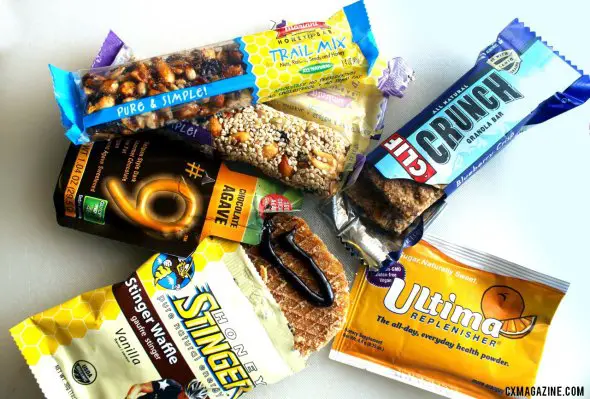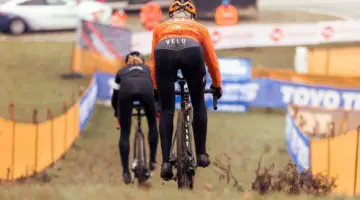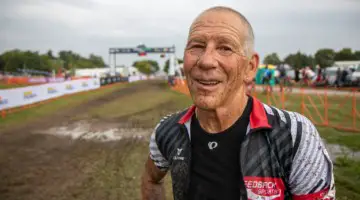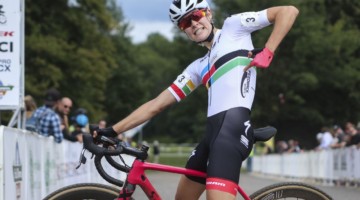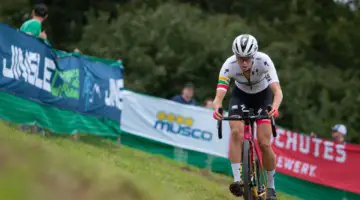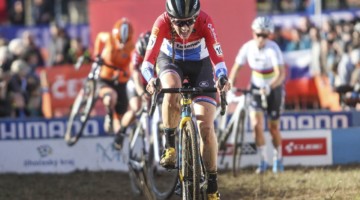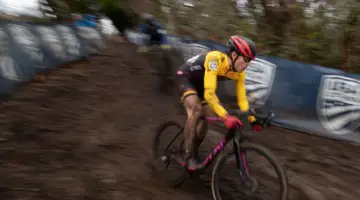Coach Chris Mayhew is always looking for Training Tuesday column ideas that address the needs of readers. Last week, he got a question about how to eat properly on race day, especially if you are racing later in the afternoon. In today’s column, Mayhew offers his advice and experiences to help make sure you are fueled for your cyclocross race. If you have questions or topics you’d like to see Coach Mayhew address, reach out to him on Twitter at @csmayhew or submit your questions via e-mail to news [at] cxmagazine.com.
Thanks to Justin Sorber, via Twitter, for the column idea this week. I’m always looking for new topics to write about, so if you have something you’d like to see covered please reach out.
Coaching involves being a jack of all trades and a master of none. Today’s column is about fueling for race day, specifically when you have a late start time. I can give you a lot of lessons I’ve learned, but if you’re looking for very specific input, it would be best to hire an expert in the field. Still, I’ve made a lot of mistakes personally over the years so why don’t you learn from me rather than make them yourself?
Your start time determines everything on race day. From there it’s a matter of planning around that deadline. Ideally, your final pre-race meal would be 3-4 hours before your race. You don’t want a large bolus in your stomach at race time. A large mass in your stomach being bounced around will not feel good. Also, it takes water to process food and when racing that water is being used to produce sweat and maintain plasma volume. That means that food is going to be processed after exercise. One or both of those issues is a recipe for boo belly (otherwise known as ’cross gut).
Morning Eating
If your race is relatively early in the morning, say 8 or 9 a.m., I’d suggest a few tweaks. Eat very well before you go to bed, including a snack at bedtime. Apple slices with peanut butter are my go-to snack for this. In the morning, eat as early as you reasonably can. Focus on easily digestible foods, primarily carbohydrates, and lots of water. You probably won’t have to eat as much as you would for a mid-day race, hopefully just 300-400 calories since you should have some good glycogen stores from overnight, plus your race is shorter. It will definitely take some experimentation.
What to eat if you’re racing between say 9 a.m. and 1 p.m.? You want about 500 calories, total. You want something that is reasonably easy to digest that contains mainly carbohydrates, but also some fat and protein. Lastly you want something that is medium to high on the glycemic index. Don’t eat cereal (too high on the index, also 500 calories of cereal is a huge mass of cereal), but you also don’t want a steak. Find what works for you. My go to for years now has been 1/2 cup (uncooked) rice and two eggs, along with some kale or spinach.
Whatever you decide on, it should be well known to you. I eat that meal every day before intervals. Nothing new on race day.
You’ll also want about 750ml of liquid. I find it takes me 500ml just to get out of the hole I’m in from overnight. Then I drink 500ml of beet root juice. The data behind it is very good, as is my anecdotal experience with it. It’s really one of the very few legal supplements that actually work. I think it’s worth looking into if you’re not already using it as it’s very low risk—it’s just food. Again, experiment in training first. Lastly, make sure you have access to a water bottle on the drive to the race.
Hopefully, you arrive at the venue roughly 2-3 hours before your race. At that point, replace calories as you would on a bike ride. I’ll typically have a Clif bar 90-120 minutes out just to replace the calories burned from course inspection. I also consume a sports drink while riding, one bottle per hour, more if it’s hot.
An hour out, if it’s very hot, I’ll use Skratch Hyper Hydration. You should really read this before you think about using it. I’ve found it’s the only way I can get through races hotter than 75°F, but 1700mg of sodium is a lot. Again, use that in training first.
Before I go to staging I will often consume a gel or 3 Skratch chews. You shouldn’t need that to get through a race. I think for me it’s a crutch. But it’s also low penalty as these things go. I typically only do that for hour-long races.
Late Afternoon Fueling
As Justin pointed out, it’s very hard to know what to eat when your race is late in the day. If you’re racing after 1 p.m., maybe even after noon, you need two 500-calorie meals. But that can be very hard to stomach while dealing with race nerves. That’s especially true for me once I reach the venue. I’ve seen a lot of people struggle with the issue when they make the move from Cat 3/4 to 1/2/3 and racing several hours later in the day.
My first recommendation would be eat whatever you want first thing in the morning. It’s 5+ hours before you race and it won’t matter at all what you eat then in terms of digestive issues later. Take whatever you normally would have eaten as your breakfast and eat that as your second meal of the day. Eat that meal 2-3 hours out from your race. That way you have a meal that you know works for you and you’re still somewhat on your old fueling plan from before. That should get you through the first year of racing till you find other things you can eat.
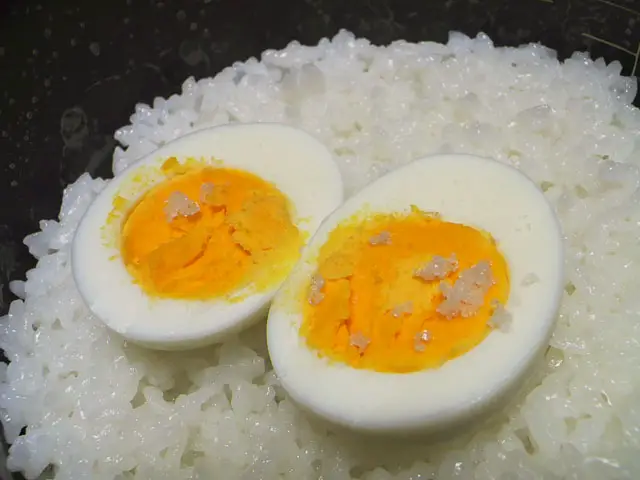
Rice and eggs with a bit of soy sauces is Chris Mayhew’s breakfast of choice. Oatmeal was another popular choice among National Champions in our annual interviews, but the key is to avoid experimenting on race day. photo: khastie0714
Currently what I do is rice and eggs at home, then Noosa yogurt and granola at the venue. I fine tune with Clif bars or chews as needed from there. Nutrition isn’t always exact and you should always listen to your body. Have a plan for eating but don’t stick to it blindly when you know you’re hungry. Eat and drink if you need to. If you’re worried about boo belly, consuming 200-300ml of water will aid in processing whatever you’ve eaten.
You should be able to race and not be hungry for 30-60 minutes post-race. If you’re finishing and bonking as you cross the line or very shortly thereafter, you didn’t eat enough somewhere in the last 24 hours.
That said, ideally you’d eat a post-race meal within 30-45 minutes after the race. You want some carbohydrates and some protein, in a 2:1 or 3:1 ratio, and around 300-500 calories total. I am not a fan of recovery drinks if I can avoid them. I won’t fight you over it, but anytime you can eat real food, I’d suggest it.
I eat two servings of Chobani yogurt with granola and half a cup of blueberries. It’s one of my favorite meals, which makes it a no-brainer after racing. After that, maybe grab something from the food truck and watch the elites race. Then go out to dinner with your friends and eat well, especially if you are racing the next day. My favorite part of ’cross might be eating dinner with friends post race.
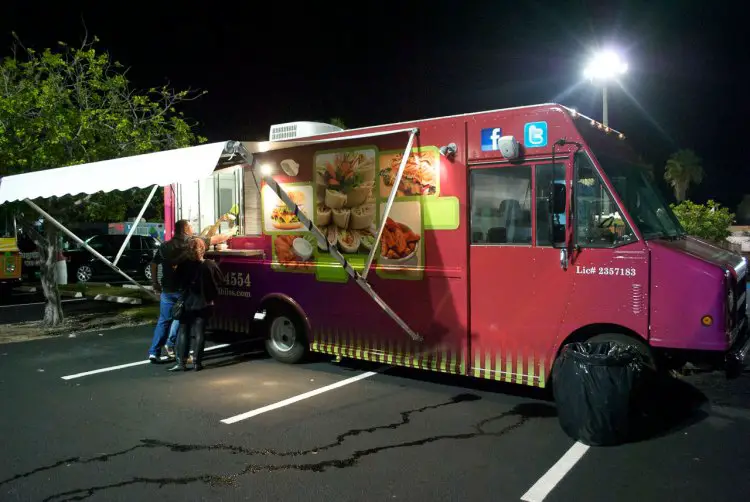
Food trucks are becoming popular at races and are a good option for post-race food. photo: Bob B. Brown
Eat. Eat a lot. Eat things that provide long-lasting fuel for your body, but can also be processed reasonably easy. Drink a lot of water to aid in the processing of that food. Eat things you want to eat. Follow your favorite pro racers on Instagram for food ideas. They will post their meals!
If you’re having trouble with bonking, start tracking your total calories for 24-48 hours before your race starts to make sure you’re getting enough. Once you have that down then start digging into the composition of those calories. And good luck with your racing!
Have your best cyclocross season ever with all of our Training and Technique Tuesday pieces here from coaches Mayhew, Adam Myerson, Kenneth Lundgren and others.
Also, go to school with our Cyclocross Academy and Cyclocross 101 articles here.













